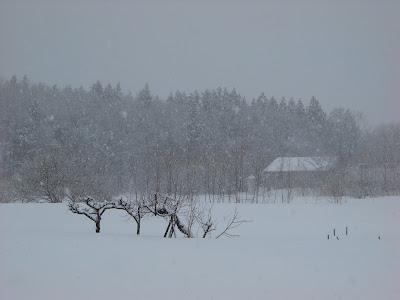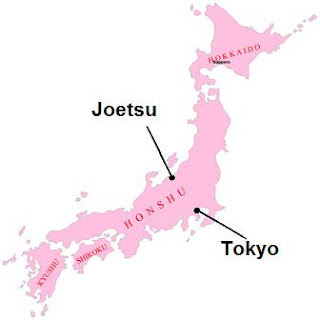It's that time again--JET placements are coming out, and in the next few days 11 lucky people will be frantically scouring the internet for information about Joetsu. I wrote this post a little over a year ago, before I came to Japan, and apparently it's come up in Google searches about Joetsu, so I figure this is as good a time as any to update those impressions now that I've been here almost a year.
(I also posted these pictures from Google Earth, which I now find hilarious because you know that "OMG, snow" picture of Takada? That's clearly beginning-of-winter snow. That's PUSSY snow. Two months later, shit gets real.)
Um... anyway, I may or may not continue to indulge in this kind of good-natured hazing, but the truth is that I love it here. I was more or less bang-on with my attempt to describe the layout in that old post: there's a town center (Naoetsu is north, Takada is south), and outside that, miles and miles of rice fields and some teacher housing. Joetsu itself isn't total inaka; there's a JUSCO, a Uniqlo, a movie theater, restaurants, a coffee shop, three McDonalds, a nice park, some okay bars (though the regular Saturday night crowd is nothing to write home about). There are also a ton of big box stores, which might surprise you if you've never been to Japan; apparently suburban sprawl and architectural eyesores are not unique to my homeland. It ain't San Francisco, but it has more or less everything you need.
And then there's the rest. There are still vast parts of it that I haven't explored (a project for an upcoming weekend, I think), but Yoshikawa, where I live, is a more or less typical example. It takes 30 to 40 minutes to get here from town. There are a few shops (conbini, pharmacy, gas station) within about 10 minutes' walk, and a bit farther out there's a 7-11, a sake brewery, and a nice little onsen with a restaurant (typical teishoku fare). There are two mountains, Yoneyama and Okamidake. The nearest supermarket is about a 10 minute drive away, in the next ward. Other than that, Yoshikawa consists entirely of rice fields.
I probably haven't sold anyone on it with what I've said here, but Joetsu can be a great place if you let it. I was never a nature type before I got here but watching the changes in the rice fields throughout the seasons is an awesome thing (awesome as in "full of awe," not "totally tubular"). The mountains, the coastline, the snow--all of them are absolutely stunning. We're no more than an hour away from awesome snowboarding (by that I DO mean "totally tubular"), and Nagano City is a lovely little city (with real shopping, jazz bars, Starbucks, Thai food and a famous temple) that's about an hour and a half away by train.
It has been a pretty intense year, but Joetsu has been good to me, good enough that I've signed up for another year. Bring on the snow!










